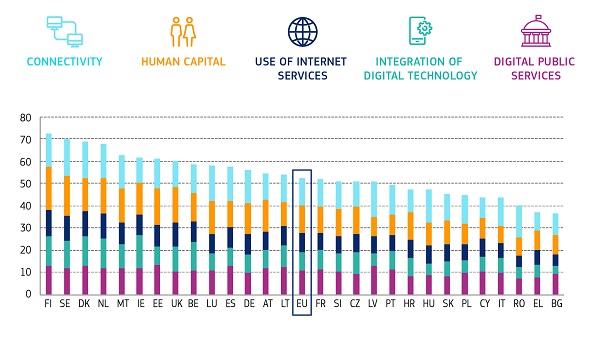 Credit: DESI 2020
Credit: DESI 2020
The European Commission has just published the 7th edition of its annual report on the digital economy and society: the Digital Economy & Society Index (DESI); Luxembourg is in 10th place out of the 28 countries analysed.
The DESI constitutes a composite index to assess the evolution of EU countries towards a digital economy and society. The index measurement framework distinguishes a total of 34 indicators divided into five main types of categories: connectivity, human capital, use of the Internet, integration of digital technologies and digital public services.
In the DESI 2020, the European Commission noted for Luxembourg significant progress in the field of digital public services. Although the country lost a place in the general ranking compared to last year, Luxembourg climbed from 16th to 14th place in digital public services, mainly thanks to such services for companies, obtaining a score of 99 out of 100 against a European average of 88. Luxembourg's overall performance on digital public services thus experienced a growing faster than the EU-28 average. Luxembourg also stood out when it comes to pre-filled online forms.
In addition, the report noted that 58% of internet users in the Grand Duchy actively use online public services. Luxembourg's potential growth margin is therefore large compared to the EU average, which stands at 67%.
DESI 2020 identified poorer results mainly in three categories. Regarding the category “integration of digital technologies”, Luxembourg lost a position and is slightly below the European average. However, the Commission highlighted initiatives launched by the government at this level, for example Luxembourg has decided to fully engage at the European level on digital technologies by signing, in particular, the Declaration creating the European Blockchain Partnership (EBP) and the Declaration of cooperation on Artificial Intelligence (AI).
In the “human capital” category, Luxembourg also lost a place and is in 8th position, which remains above the European average. The category in which Luxembourg's performance fell most significantly was that of "the use of Internet services" in which the country lost three places.
DESI 2020 also highlighted the various digital initiatives launched in member states in the context of the COVID-19 pandemic. The Commission thus underlined the role played in Luxembourg by the portals Guichet.lu and MyGuichet.lu, which offer residents a wide range of online services and whose attendance rate has increased sharply in recent months. It should also be noted that the data making up the DESI 2020 indicators are for 2019.
Finally, the European Commission underlined the central coordination role of the new Ministry of Digitalisation, which is intended to bring major improvements to a digital public administration. According to the Commission, further work to create new digital public services is fundamental to complete the process of modernising public administration.
The full DESI 2020 index is available at https://ec.europa.eu/digital-single-market/en/desi.








